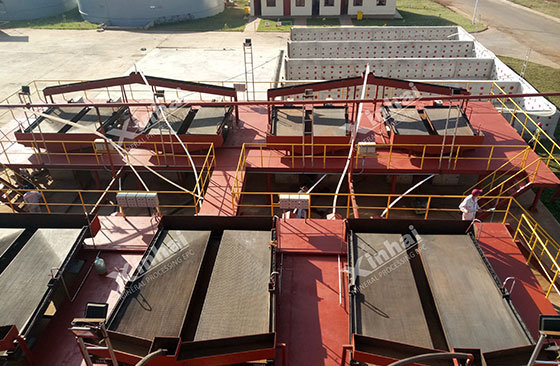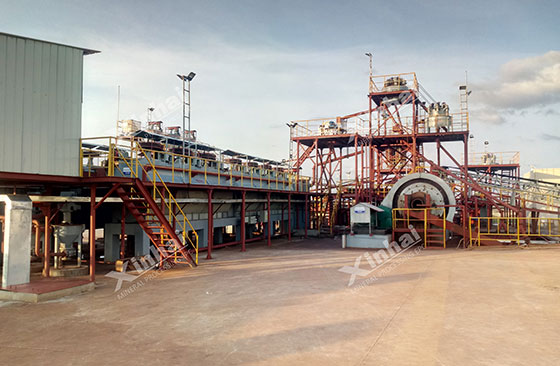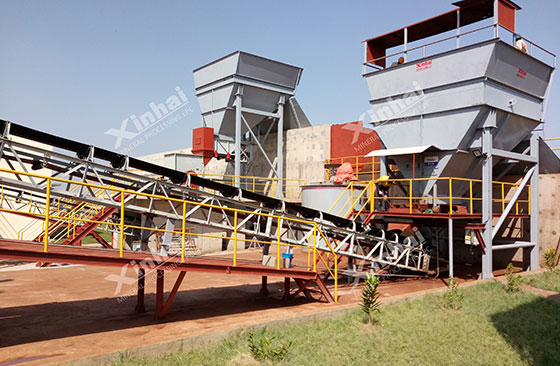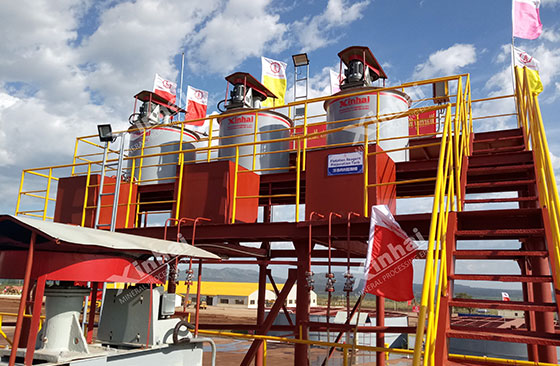
Rare earth minerals have attracted much attention due to their wide range of uses in high-tech, military and industrial applications. Rare earth minerals often coexist closely with associated gangue minerals, and scientific ore beneficiation methods are required to separate rare earth minerals from associated gangue. According to the differences in physical and chemical properties between rare earth minerals and associated minerals, the beneficiation of rare earth minerals usually adopts a variety of technical means such as radiation beneficiation, gravity beneficiation, magnetic separation, flotation, electrostatic separation and chemical beneficiation. This article will introduce the principles of various rare earth ore beneficiation methods and their advantages and limitations in practical applications.
Gravity beneficiation is a method of separating rare earth minerals and gangue minerals by the difference in density. Rare earth minerals usually have a higher density, while gangue minerals such as quartz and calcite have a lower density, so they can be separated by gravity separation equipment such as cone concentrators, spiral concentrators, shaking tables, etc.

Gravity separation is widely used in the production of seashore sand mines, and is often used as a means of pre-enrichment in the beneficiation process of some rare earth vein ores. The advantages of gravity separation are simple operation, low cost, and the ability to effectively separate rare earth minerals. However, gravity separation has high requirements for mineral particles and is not suitable for processing ores with too small particle sizes.
Magnetic separation uses the difference in magnetic susceptibility between rare earth minerals and associated gangue minerals to separate them using magnetic fields of different intensities. Some rare earth minerals have weak magnetism, so they can be separated from non-magnetic minerals by magnetic separation equipment.
In seaside sand mines, weak magnetic separation is usually used to separate ilmenite from monazite, while strong magnetic separation can be used to separate monazite from minerals such as zircon and quartz. In the ore beneficiation of rare earth vein ores, strong magnetic separation is often used to simplify the flotation process and save reagents. With the continuous advancement of strong magnetic technology, strong magnetic separation will play an increasingly important role in the beneficiation of rare earth ores in the future.

Flotation is one of the main methods in the beneficiation of rare earth ore. It uses the difference in the physical and chemical properties of the surface of rare earth minerals and associated minerals, and uses flotation reagents to separate rare earth minerals from gangue and other minerals to obtain concentrates.
Flotation is widely used worldwide. In the production of seaside sand mines, after heavy sand is obtained by gravity separation, rare earth concentrate is often further obtained from heavy sand by flotation. The advantage of flotation is that it has high separation accuracy and is suitable for processing ores with small particle size and complex composition. However, this method consumes a lot of reagents and has high operating requirements.
Electrostatic separation separates rare earth minerals and associated minerals by the difference in electrical conductivity. Rare earth minerals are usually poor conductors, while associated minerals such as ilmenite have good electrical conductivity. Electrostatic separation equipment can use this characteristic to separate rare earth minerals from other conductive minerals.

Electrostatic separation is mainly used in the heavy sand concentration operation of seaside sand mines. Its advantage is that it can efficiently separate minerals with obvious differences in conductivity, but this method has high requirements for equipment and is complex to operate, and is not suitable for all types of rare earth minerals.
Chemical ore beneficiation is based on the special chemical properties of certain rare earth minerals. For example, for rare earth deposits adsorbed on kaolin or clay in ionic form, the rare earth ions can be easily dissolved in sodium chloride or ammonium sulfate solutions, and the rare earth minerals can be recovered by leaching and precipitation. For fluorocarbonate rare earth minerals, they can be purified by chemical methods such as acid leaching or high-temperature roasting.
Chemical ore beneficiation is mainly used to treat ion-adsorbed rare earth ores and some rare earth minerals that are difficult to separate by physical methods. This method is usually used in concentrate processing after flotation or magnetic separation, which can further purify rare earth minerals. Although the chemical beneficiation method has high precision, its disadvantage is that it consumes a large amount of chemical reagents and the processing process is relatively complicated.

There are various rare earth ore beneficiation processes, and the selection of various methods depends on the specific properties of the ore and production requirements. Gravity separation is mainly used for the pre-selection of rare earth ores. Magnetic separation and flotation are the most widely used main separation technologies, while electrostatic separation and chemical separation are suitable for some special types of rare earth minerals. In the future, with the advancement of technology, the rare earth ore dressing process will be further optimized, the dressing efficiency will be improved, the production cost will be reduced, and a more stable supply of rare earth resources will be provided for the global high-tech industry.
To find out more about our products and solutions, please fill out the form below and one of our experts will get back to you shortly.